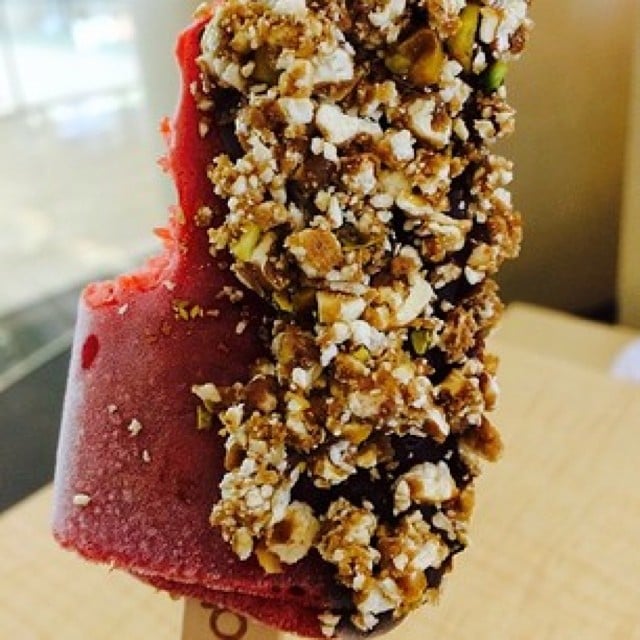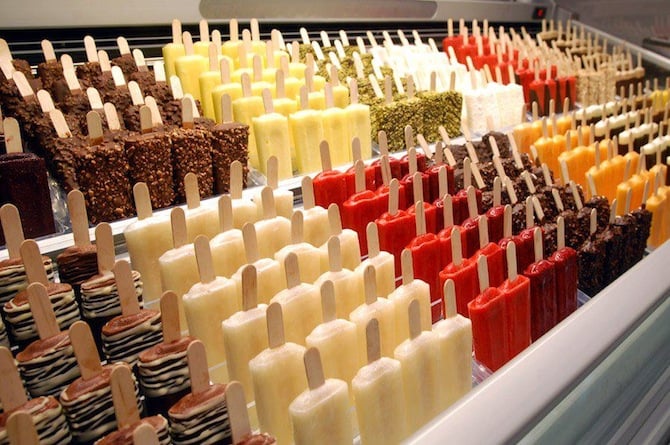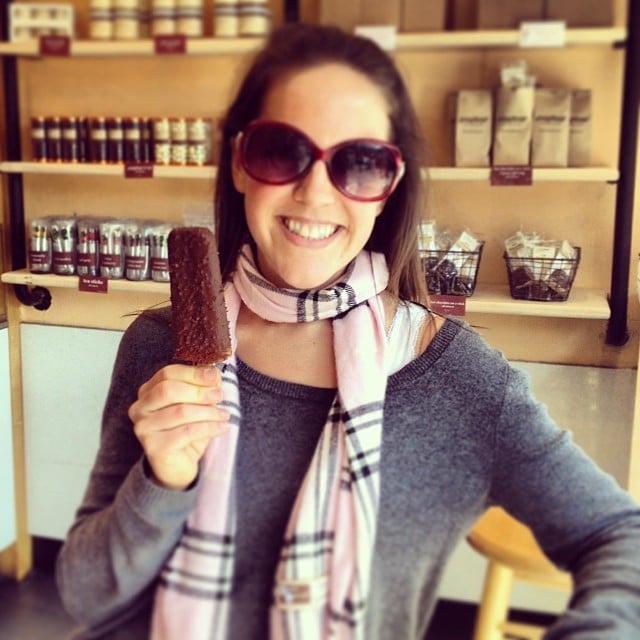Discover New York: Tracing NYC History Through Gelato
I’ve had gelato and I’ve had Popsicles, but it’s only been recently that I discovered you could have them as one. At Popbar in the West Village, they focus on offering all-natural gelato, frozen yogurt and sorbet made fresh daily using Kosher-certified fresh fruit and milk with no artificial ingredients or gluten. Staff make the bars in small batches of 26 per time in an open kitchen, so you can watch them being made. While the yogurt and sorbet are good, I’m a fan of the gelato, and some flavors include pistachio, banana, chocolate, coconut, coffee, peanut butter, mint and more.
What makes PopBar unique isn’t just the fact the gelato is served on a stick, but that it turns into a sundae-making experience with the opportunity to dip your treat into melted milk, dark or white chocolate before being coated with a variety of poppings (yes, poppings, not toppings) like pistachio bits, caramel corn, coconut shavings, hazlenut, dark chocolate sprinkles, coffee grains, almonds and granola.
Tip: Ask for it half- dipped, so you can taste the gelato in both its pure and decadent form.
What I also find interesting about Popbar is its location on the same block as Grom, a traditional Italian gelato shop. Here they focus on making old fashioned from-scratch gelato with high-quality ingredients like vanilla from Madagascar, lemons from Sicily and Tonda Gentile hazlenuts.
Just for a quick history recap, Greenwich Village in the 1850s saw a huge influx of Italian immigrants, with Bleeker Street being the main hub of the old neighborhood. Here you can still find a number of historic Italian eateries on this street along with Grom, like Faicco’s (open since 1900, their arancini balls are amazing) and Pasticceria Rocco (holy cannoli!). Moreover, Our Lady of Pompeii Church at 25 Carmine Street serves as a beautiful reminder of the work Father Demo did to create a place of worship for Italian immigrants as well as help them procure fair-paying jobs and assimilate into New York City culture.
 In the 1920s, artists and bohemian types began moving to the Village to take advantage of cheaper rent and to escape the materialist society uptown. From there the neighborhood started taking a very creative spin. For example, the Twin Peak’s house at 102 Bedford showcases an 1830s farmhouse re-designed as a free Hansel and Gretel-style artists house by budding architect Clifford Daily, while Cherry Lane theater, once a brewery in 1836, was started by artists in 1924 to showcase experimental theater.
Having the two gelato shops on the same block represents both the old Italian neighborhood and the newer think-outside-the-box community in the West Village. For a true taste of the local culture, I recommend you try both.
Note: During my West Village food and dessert tours we make a stop at Popbar. Click here for more info, or email jessieonajourney (at) gmail (dot) com.
In the 1920s, artists and bohemian types began moving to the Village to take advantage of cheaper rent and to escape the materialist society uptown. From there the neighborhood started taking a very creative spin. For example, the Twin Peak’s house at 102 Bedford showcases an 1830s farmhouse re-designed as a free Hansel and Gretel-style artists house by budding architect Clifford Daily, while Cherry Lane theater, once a brewery in 1836, was started by artists in 1924 to showcase experimental theater.
Having the two gelato shops on the same block represents both the old Italian neighborhood and the newer think-outside-the-box community in the West Village. For a true taste of the local culture, I recommend you try both.
Note: During my West Village food and dessert tours we make a stop at Popbar. Click here for more info, or email jessieonajourney (at) gmail (dot) com.

Strawberry popSorbetto dipped in dark chocolate and topped with caramel corn and pistachios. Photo courtesy of @rykahapsariputri on Instagram.



Hi, I’m Jessie on a journey!
I'm a conscious solo traveler on a mission to take you beyond the guidebook to inspire you to live your best life through travel. Come join me!
Want to live your best life through travel?
Subscribe for FREE access to my library of fun blogging worksheets and learn how to get paid to travel more!
Turn Your Travel Blog Into A Profitable Business
Subscribe to my email list to snag instant access to my library of workbooks, checklists, tutorials and other resources to help you earn more money -- and have more fun -- blogging. Oh, and it's totally FREE! :) // Privacy Policy.